Fleurs du Mal Magazine



Jef van Kempen photos: Landscape 60
fleursdumal.nl magazine
More in: Jef van Kempen, Jef van Kempen Photos & Drawings, Kempen, Jef van, Photography, Spurensicherung
.jpg)
Julia Origo
(1965 – 2005)
Portrait of E.
The short and desperate life of E.
(the girl nobody noticed on November 4th 1990)
rubbing shoulders, smiling dreamily,
with a thought bubble above her head saying:
“I said I would NOT tear up”.
E. tied a ligature around her neck,
strangled herself in a similar fashion
as many times before.
Although on suicide watch,
in the short time she was unobserved
she did ENOUGH to starve herself of oxygen,
trigger brain damage.
In a vegetative state,
transferred to hospital,
she would not recover
A nightmare of guilt to follow.
A decision to switch her off
life support was made seven days later.
THE END
justifies the means.
(Suicide is the act of deliberately killing oneself. Risk factors for suicide include mental disorder, such as depression, personality disorder, alcohol dependence, or schizophrenia, and some physical illnesses, such as neurological disorders, cancer, and HIV infection. There are effective strategies and interventions for the prevention of suicide.)
(from: Escape, 1991)
Observations
Thoughts and observations on man and nature:
my mental temperament is highly developed,
if you were a gentleman you’d offer me a ride
and hear the satisfaction in my voice,
maybe I would blush, every now and then,
maybe not,
maybe I’ll write a poem.
(From: Transfusion, 1987)
Julia Origo poetry
kempis poetry magazine
More in: Origo, Julia

Optreden Kinderstadsdichter Tilburg
tijdens Via del Mondo op 16 mei 2010
Sara Bidaoui, Tilburgs Kinderstadsdichter, zal een optreden geven
op kinderfestival Via del Mondo.
Tijdens dit gratis toegankelijke kinderfestival op 16 mei in het
Wilhelminapark in Tilburg treden kindergroepen op uit Malawi, Brazilië
en India. Ook Ralf Mackenbach, winnaar van het Junior Eurovisie
Songfestival, is op 16 mei te zien. Sara zal om 16:20 op het Plan
Kinderpodium een aantal gedichten ten gehore brengen.
Via del Mondo wordt georganiseerd door Mundial Productions met steun
van Plan Nederland en het ministerie van Buitenlandse Zaken.

Via del Mondo Tilburg
Zondag 16 mei 2010 Wilhelminapark Tilburg
PLAN Kinderpodium
12.25 – 12.35 Parade del Mondo door het Wilhelminapark
12.35 – 12.45 Opening Via del Mondo Tilburg 2010
12.45 – 13.15 Mlodza Stars (Malawi)
13.45 – 14.15 Comunidarte (Brazilië)
14.45 – 15.15 Binang Mmino (Zuid-Afrika)
16.20 – 16.25 Winnaar Via del Mondo’s Got Talent: Reeshoeve Meiden
16.25 – 16.30 Kinderstadsdichter Tilburg: Sara Bidaoui
16.35 – 17.15 Ralf Mackenbach
17.20 – 17.35 Grande Finale met kindergroepen en Ralf
Presentatie: Steef & Bob Show
Wereldkinderpodium
13.20 – 13.40 Workshop Binang Mmino (Zuid-Afrika)
14.20 – 14.40 Dans workshop Mlodza Stars (Malawi)
15.20 – 15.40 Percussie workshop Comunidarte (Brazilië)
15.45 – 16.15 PLAN Kinderkoor
Presentatie: Guus Neijenhuis en kinderpresentatoren Nimo & Shukria
Malle Balle circustent
12.30 – 16.15 Malle Balle circusworkshops & show
16.15 – 16.20 Malle Balle parade naar het Plan Kinderpodium
![]()
fleursdumal.nl magazine
More in: Children's Poetry, City Poets / Stadsdichters, Kinderstadsdichters / Children City Poets
.jpg)
C h a r l e s C r o s
(1842-1888)
2 P o è m e s
S o n n e t
A Madame N.
Je voudrais, en groupant des souvenirs divers,
Imiter le concert de vos grâces mystiques.
J’y vois, par un soir d’or où valsent les moustiques,
La libellule bleue effleurant les joncs verts ;
J’y vois la brune amie à qui rêvait en vers
Celui qui fit le doux cantique des cantiques ;
J’y vois ces yeux qui, dans des tableaux encaustiques,
Sont, depuis Cléopâtre, encore grands ouverts.
Mais, l’opulent contour de l’épaule ivoirine,
La courbe des trésors jumeaux de la poitrine,
Font contraste à ce frêle aspect aérien ;
Et, sur le charme pris aux splendeurs anciennes,
La jeunesse vivante a répandu les siennes
Auprès de qui cantique ou tableau ne sont rien.
Réponse
Ce que je te suis te donne du doute ?
Ma vie est à toi, si tu la veux, toute.
Et loin que je sois maître de tes voeux,
C’est toi qui conduis mon rêve où tu veux
Avec la beauté du ciel, en toi vibre
Un rhythme fatal ; car mon âme libre
Passe de la joie aux âpres soucis
Selon que le veut l’arc de tes sourcils.
Que j’aye ton coeur ou que tu me l’ôtes,
Je te bénirai dans des rimes hautes,
Je me souviendrai qu’un jour je te plus
Et que je n’ai rien à vouloir de plus.
.jpg)
Charles Cros poésie
k e m p i s p o e t r y m a g a z i n e
More in: Cros, Charles
.jpg)
L o u i s T h. L e h m a n n
door Ed Schilders
Louis Lehmann werd geboren in 1920, begon in 1939 te publiceren in kranten en tijdschriften, en had dus zijn zilveren schrijversjubileum al gevierd toen hij zichzelf in 1966 een literair publicatieverbod oplegde. Ik heb de uitleg van die zelfopgelegde stilte nooit helemaal begrepen, en dat is ook nu weer het geval als de kwestie ter sprake komt in de inleiding door Alida Beekhuis op Lehmanns nieuwe boek Laden ledigen. Het verhaal is altijd hetzelfde: Lehmann voelt zich erkend als dichter/schrijver – Ter Braak en Vestdijk hadden hem hun lof toegewuifd – en tegelijk miskend ‘op zijn vakgebied’, de scheepsarcheologie. Hij blijft schrijven en muziekstukken componeren, maar neemt zich voor niets daarvan te publiceren totdat hij ook als archeoloog erkenning gekregen heeft. Dat duurt even. Dertig jaar. In 1996 promoveert hij op een proefschrift over door roeiers voortbewogen galeischepen in de oudheid, en wel voor zover dat onderwerp werd benaderd in de Renaissance en tijdens de Barok. Alida Beekhuis noemt het ‘een zeer belangrijke gebeurtenis in zijn leven.’ En: ‘daarmee hief hij zijn ban op literaire publicaties op.’ Twee weken na de promotie had Lehmann een nieuwe dichtbundel persklaar.
Wie moest met dat publicatieverbod gestraft worden? De wetenschap, de poëzieliefhebber, of de auteur zelf? Was het hoogmoed of juist nederigheid? Je zou het hoe dan ook een vorm van gevaarlijk literair leven kunnen noemen. Lehmann is 75 jaar als de kersverse doctor de oude dichter weer vrijheid van drukpers toestaat. Dertig jaar niet publiceren! Dat lijkt, achteraf, zoiets als de zelfverkozen status van ‘poète maudit’; Lehmann kon al die tijd immers ook niet bevroeden dat hij in 1996 nog aan zijn beste letterjaren zou beginnen als ‘éminence grise’. In druk onder andere met een verzameluitgave die door Tom van Deel werd samengesteld; als presentator van en commentator op bijzondere muziekopnamen op VPRO-radio; als troeteldichter op poëziefestivals, waar hij met aanstekelijk plezier voorleest, rapt, tapt, en in de afterparty de tango danst.
Laden ledigen zegt het al: wat gedurende die dertig jaar geschreven werd, is nu uit de spreekwoordelijke lade bevrijd. Bovendien had de auteur vóór die tijd ook al een ladekastje en uit dat meubilair is nu een uitbundige keuze gemaakt. Dat Lehmann kan dichten en dansen, dat hij mondharmonica speelt en piano, dat wisten we al. Uit de ladekasten zijn nu ook vertalingen van Engelse en Spaanse poëzie opgegraven. Er komen partituren van zijn composities aan het licht. Tekeningen uit 1938, en een toneeltekst. Transcripties ook van de ‘praatjes’ die hij in zijn VPRO-muziekprogramma hield dan wel voorlas, met als uiterst vervreemdend effect dat de besproken muziekstukken uiteraard niet gedraaid worden: ‘Ik zal nu besluiten met ‘King of Kings’. En daarmee neem ik afscheid van u.’
Het zwaartepunt van het boek ligt bij de poëzie. Die is zoals we Lehmanns werk hebben leren waarderen: in de vorm zeer gevarieerd, en wars van elke letterkundige conventie – alleen Lehmann komt ermee weg om ‘Oidipoes’ te laten rijmen op ‘O, die poes’ en ‘octopus’. Een groot aantal gedichten verwijst inderdaad naar de tijd waarin ze in de lade beland zijn. Over de vernieuwing dan wel vernieling van de binnenstad van Amsterdam spreekt de dichter met grote regelmaat zijn anathema uit, te beginnen bij burgemeester Samkalden en ideoloog Han Lammers. Er worden zeldzame woorden gebruikt als ‘ludiek’. Een vijfregelig vers begint met: ‘Huisje slopen, bankje bouwen,/ Van Rokin tot Overtoom…’ Het werkt nog beter als je beseft dat je dat moet lezen op de melodie van ‘Zakdoek leggen/ Niemand zeggen…’ Het zijn periodestukken, maar wel heel mooie, en ze zijn in hun poëtische bedoeling nog lang niet verouderd, misschien wel weer urgent geworden.
De belangrijkste bijdrage is echter de eerste, getiteld ‘Fragmenten jeugd’. Autobiografie op zijn Lehmanns. In dertig pagina’s beschrijft hij alles (zegt hij) wat hij zich herinnert uit zijn jeugd (die bij Lehmann ook nog eens vijfendertig jaar duurt, totdat hij ‘naar Amsterdam vertrok’). Deze schets dient te worden gelezen als de hiëroglyfen op antieke tempelwanden – bevat zelfs enige soortgelijke tekeningen – en biedt de sleutels waarmee een aantal van de gedichten nader ontsloten kan worden. Met Laden ledigen is Lehmann de archeoloog van zijn eigen oeuvre geworden. Het is de ultieme verzoening van de doctor met de dichter.
Laden ledigen – een keuze uit hervonden werk van L. Th. Lehmann – De Bezige Bij – ISBN 978 90 234 2774 2
Eerder gepubliceerd in De Volkskrant
Ed Schilders over Louis Th. Lehmann
fleursdumal.nl magazine
More in: Archive K-L, Ed Schilders, Lehmann, Louis Th.
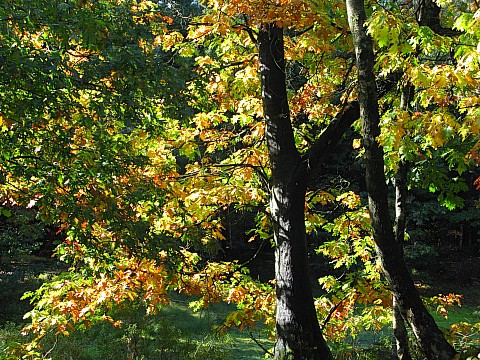
Rainer Maria Rilke
(1875-1926)
Autumn Day
Lord: it is time. The summer was immense.
Lay your shadow on the sundials
and let loose the wind in the fields.
Bid the last fruits to be full;
give them another two more southerly days,
press them to ripeness, and chase
the last sweetness into the heavy wine.
Whoever has no house now will not build one
anymore.
Whoever is alone now will remain so for a long
time,
will stay up, read, write long letters,
and wander the avenues, up and down,
restlessly, while the leaves are blowing.
.jpg)
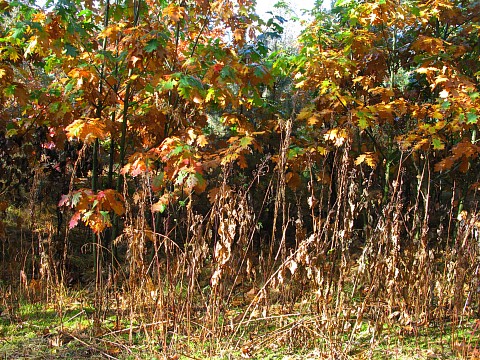
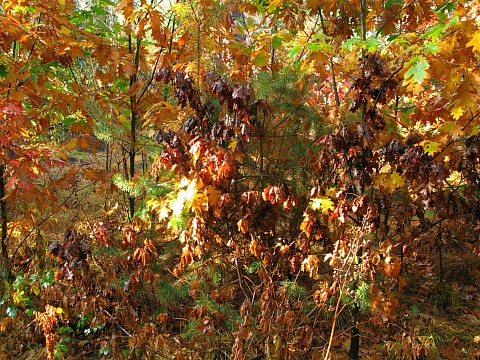
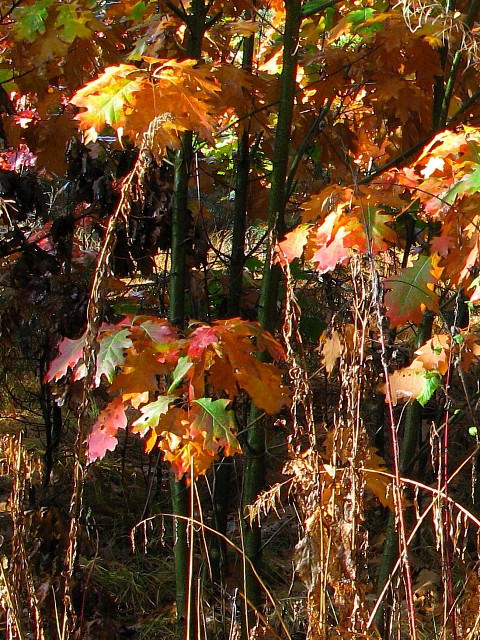
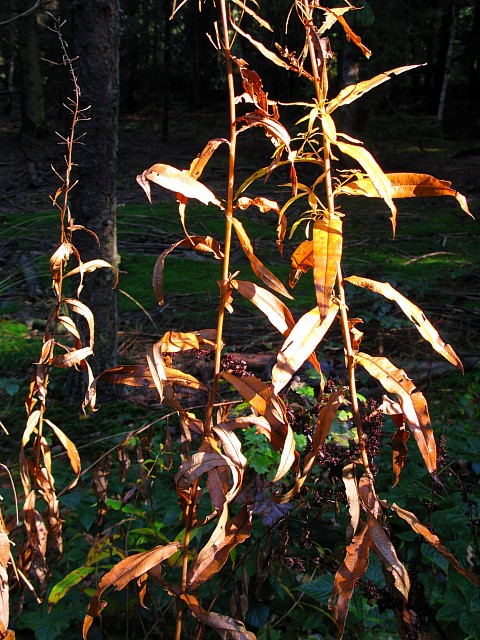
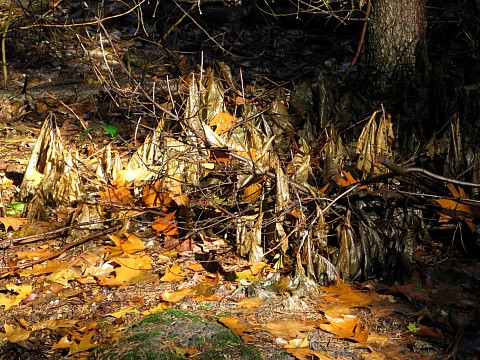
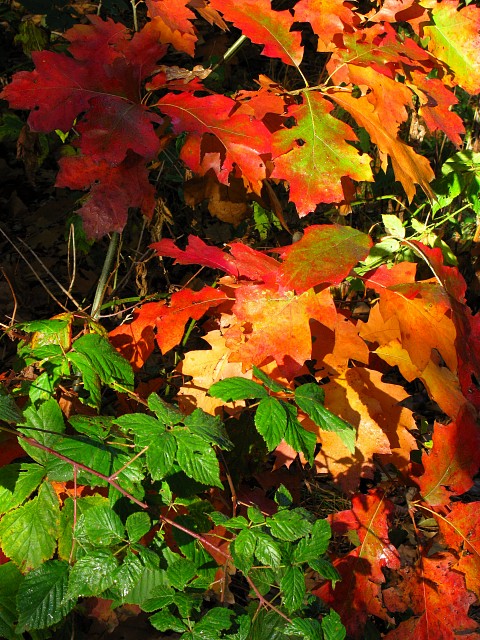
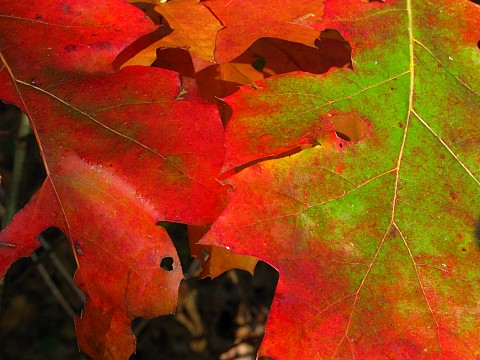
Ton van Kempen photos: Autumn 1
R.M. Rilke poetry
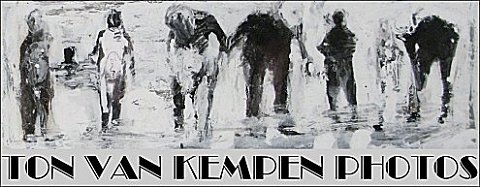
fleursdumal.nl magazine
More in: Rilke, Rainer Maria, Ton van Kempen Photos
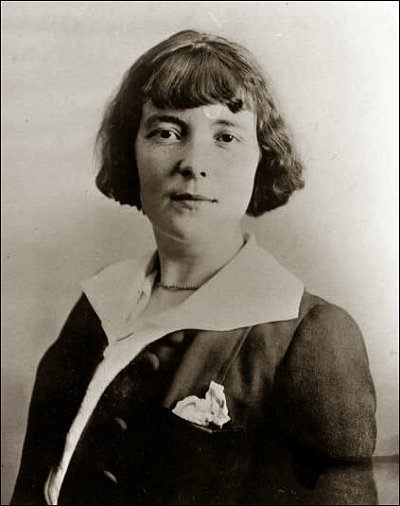
Katherine Mansfield
(1888-1923)
The Black Monkey
My Babbles has a nasty knack
Of keeping monkeys on her back.
A great big black one comes and swings
Right on her sash or pinny strings.
It is a horrid thing and wild
And makes her such a naughty child.
She comes and stands beside my chair
With almost an offended air
And says:—”Oh, Father, why can’t I?”
And stamps her foot and starts to cry—
I look at Mother in dismay…
What little girl is this, to-day?
She throws about her nicest toys
And makes a truly dreadful noise
Till Mother rises from her place
With quite a Sunday churchy face
And Babbles silently is led
Into the dark and her own bed.
Never a kiss or one Goodnight,
Never a glimpse of candle light.
Oh, how the monkey simply flies!
Oh, how poor Babbles calls and cries,
Runs from the room with might and main,
“Father dear, I am good again.”
When she is sitting on my knee
Snuggled quite close and kissing me,
Babbles and I, we think the same—
Why, that the monkey never came
Only a terrible dream maybe…
What did she have for evening tea?
Katherine Manfield poetry
fleursdumal.nl m a g a z i n e
More in: Katherine Mansfield, Mansfield, Katherine
.jpg)
Ein Besuch im Bergwerk
Franz Kafka (1883-1924)
Heute waren die obersten Ingenieure bei uns unten. Es ist irgendein Auftrag der Direktion ergangen, neue Stollen zu legen, und da kamen die Ingenieure, um die allerersten Ausmessungen vorzunehmen. Wie jung diese Leute sind und dabei schon so verschiedenartig! Sie haben sich alle frei entwickelt, und ungebunden zeigt sich ihr klar bestimmtes Wesen schon in jungen Jahren.
Einer, schwarzhaarig, lebhaft, läßt seine Augen überallhin laufen.
Ein Zweiter mit einem Notizblock, macht im Gehen Aufzeichnungen, sieht umher, vergleicht, notiert.
Ein Dritter, die Hände in den Rocktaschen, so daß sich alles an ihm spannt, geht aufrecht; wahrt die Würde; nur im fortwährenden Beißen seiner Lippen zeigt sich die ungeduldige, nicht zu unterdrückende Jugend.
Ein Vierter gibt dem Dritten Erklärungen, die dieser nicht verlangt; kleiner als er, wie ein Versucher neben ihm herlaufend, scheint er, den Zeigefinger immer in der Luft, eine Litanei über alles, was hier zu sehen ist, ihm vorzutragen.
Ein Fünfter, vielleicht der oberste im Rang, duldet keine Begleitung; ist bald vorn, bald hinten; die Gesellschaft richtet ihren Schritt nach ihm; er ist bleich und schwach; die Verantwortung hat seine Augen ausgehöhlt; oft drückt er im Nachdenken die Hand an die Stirn.
Der Sechste und Siebente gehen ein wenig gebückt, Kopf nah an Kopf, Arm in Arm, in vertrautem Gespräch; wäre hier nicht offenbar unser Kohlenbergwerk und unser Arbeitsplatz im tiefsten Stollen, könnte man glauben, diese knochigen, bartlosen, knollennasigen Herren seien junge Geistliche. Der eine lacht meistens mit katzenartigem Schnurren in sich hinein; der andere, gleichfalls lächelnd, führt das Wort und gibt mit der freien Hand irgendeinen Takt dazu. Wie sicher müssen diese zwei Herren ihrer Stellung sein, ja welche Verdienste müssen sie sich trotz ihrer Jugend um unser Bergwerk schon erworben haben, daß sie hier, bei einer so wichtigen Begehung, unter den Augen ihres Chefs, nur mit eigenen oder wenigstens mit solchen Angelegenheiten, die nicht mit der augenblicklichen Aufgabe zusammenhängen, so unbeirrbar sich beschäftigen dürfen. Oder sollte es möglich sein, daß sie, trotz alles Lachens und aller Unaufmerksamkeit, das, was nötig ist, sehr wohl bemerken? Man wagt über solche Herren kaum ein bestimmtes Urteil abzugeben.
Andererseits ist es aber doch wieder zweifellos, daß zum Beispiel der Achte unvergleichlich mehr als diese, ja mehr als alle anderen Herren bei der Sache ist. Er muß alles anfassen und mit einem kleinen Hammer, den er immer wieder aus der Tasche zieht und immer wieder dort verwahrt, beklopfen. Manchmal kniet er trotz seiner eleganten Kleidung in den Schmutz nieder und beklopft den Boden, dann wieder nur im Gehen die Wände oder die Decke über seinem Kopf. Einmal hat er sich lang hingelegt und lag dort still; wir dachten schon, es sei ein Unglück geschehen; aber dann sprang er mit einem kleinen Zusammenzucken seines schlanken Körpers auf. Er hatte also wieder nur eine Untersuchung gemacht. Wir glauben unser Bergwerk und seine Steine zu kennen, aber was dieser Ingenieur auf diese Weise hier immerfort untersucht, ist uns unverständlich.
Ein Neunter schiebt vor sich eine Art Kinderwagen, in welchem die Meßapparate liegen. Äußerst kostbare Apparate, tief in zarteste Watte eingelegt. Diesen Wagen sollte ja eigentlich der Diener schieben, aber es wird ihm nicht anvertraut; ein Ingenieur mußte heran und er tut es gern, wie man sieht. Er ist wohl der Jüngste, vielleicht versteht er noch gar nicht alle Apparate, aber sein Blick ruht immerfort auf ihnen, fast kommt er dadurch manchmal in Gefahr, mit dem Wagen an eine Wand zu stoßen.
Aber da ist ein anderer Ingenieur, der neben dem Wagen hergeht und es verhindert. Dieser versteht offenbar die Apparate von Grund aus und scheint ihr eigentlicher Verwahrer zu sein. Von Zeit zu Zeit nimmt er, ohne den Wagen anzuhalten, einen Bestandteil der Apparate heraus, blickt hindurch, schraubt auf oder zu, schüttelt und beklopft, hält ans Ohr und horcht; und legt schließlich, während der Wagenführer meist stillsteht, das kleine, von der Ferne kaum sichtbare Ding mit aller Vorsicht wieder in den Wagen. Ein wenig herrschsüchtig ist dieser Ingenieur, aber doch nur im Namen der Apparate. Zehn Schritte vor dem Wagen sollen wir schon, auf ein wortloses Fingerzeichen hin, zur Seite weichen, selbst dort, wo kein Platz zum Ausweichen ist.
Hinter diesen zwei Herren geht der unbeschäftigte Diener. Die Herren haben, wie es bei ihrem großen Wissen selbstverständlich ist, längst jeden Hochmut abgelegt, der Diener dagegen scheint ihn in sich aufgesammelt zu haben. Die eine Hand im Rücken, mit der anderen vorn über seine vergoldeten Knöpfe oder das feine Tuch seines Livreerockes streichend, nickt er öfters nach rechts und links, so als ob wir gegrüßt hätten und er antwortete, oder so, als nehme er an, daß wir gegrüßt hätten, könne es aber von seiner Höhe aus nicht nachprüfen. Natürlich grüßen wir ihn nicht, aber doch möchte man bei seinem Anblick fast glauben, es sei etwas Ungeheures, Kanzleidiener der Bergdirektion zu sein. Hinter ihm lachen wir allerdings, aber da auch ein Donnerschlag ihn nicht veranlassen könnte, sich umzudrehen, bleibt er doch als etwas Unverständliches in unserer Achtung.
Heute wird wenig mehr gearbeitet; die Unterbrechung war zu ausgiebig; ein solcher Besuch nimmt alle Gedanken an Arbeit mit sich fort. Allzu verlockend ist es, den Herren in das Dunkel des Probestollens nachzublicken, in dem sie alle verschwunden sind. Auch geht unsere Arbeitsschicht bald zu Ende; wir werden die Rückkehr der Herren nicht mehr mit ansehen.
Franz Kafka : Ein Landarzt. Kleine Erzählungen (1919)
fleursdumal.nl magazine
More in: Archive K-L, Franz Kafka, Kafka, Franz, Kafka, Franz
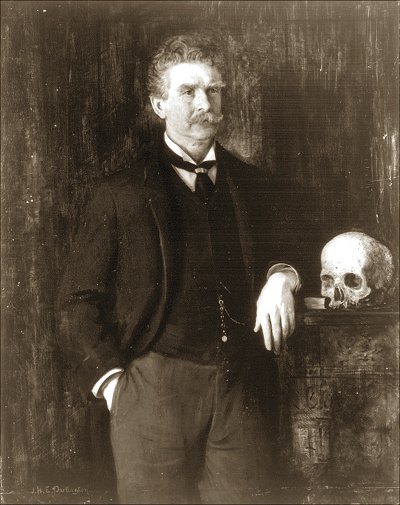
Ambrose Bierce
(1842-1914?)
A Commuted Sentence
Boruck and Waterman upon their grills
In Hades lay, with many a sigh and groan,
Hotly disputing, for each swore his own
Were clearly keener than the other’s ills.
And, truly, each had much to boast of–bone
And sinew, muscle, tallow, nerve and skin,
Blood in the vein and marrow in the shin,
Teeth, eyes and other organs (for the soul
Has all of these and even a wagging chin)
Blazing and coruscating like a coal!
For Lower Sacramento, you remember,
Has trying weather, even in mid-December.
Now this occurred in the far future. All
Mankind had been a million ages dead,
And each to her reward above had sped,
Each to his punishment below,–I call
That quite a just arrangement. As I said,
Boruck and Waterman in warmest pain
Crackled and sizzed with all their might and main.
For, when on earth, they’d freed a scurvy host
Of crooks from the State prison, who again
Had robbed and ravaged the Pacific Coast
And (such the felon’s predatory nature)
Even got themselves into the Legislature.
So Waterman and Boruck lay and roared
In Hades. It is true all other males
Felt the like flames and uttered equal wails,
But did not suffer them; whereas they bored
Each one the other. But indeed my tale’s
Not getting on at all. They lay and browned
Till Boruck (who long since his teeth had ground
Away and spoke Gum Arabic and made
Stump speeches even in praying) looked around
And said to Bob’s incinerated shade:
“Your Excellency, this is mighty hard on
The inventors of the unpardonable pardon.”
The other soul–his right hand all aflame,
For ’twas with that he’d chiefly sinned, although
His tongue, too, like a wick was working woe
To the reserve of tallow in his frame–
Said, with a sputtering, uncertain flow,
And with a gesture like a shaken torch:
“Yes, but I’m sure we’ll not much longer scorch.
Although this climate is not good for Hope,
Whose joyous wing ‘twould singe, I think the porch
Of Hell we’ll quit with a pacific slope.
Last century I signified repentance
And asked for commutation of our sentence.”
Even as he spoke, the form of Satan loomed
In sight, all crimson with reflections’s fire,
Like some tall tower or cathedral spire
Touched by the dawn while all the earth is gloomed
In mists and shadows of the night time. “Sire,”
Said Waterman, his agitable wick
Still sputtering, “what calls you back so quick?
It scarcely was a century ago
You left us.” “I have come to bring,” said Nick,
“St. Peter’s answer (he is never slow
In correspondence) to your application
For pardon–pardon me!–for commutation.
“He says that he’s instructed to reply
(And he has so instructed me) that sin
Like yours–and this poor gentleman’s who’s in
For bad advice to you–comes rather high;
But since, apparently, you both begin
To feel some pious promptings to the right,
And fain would turn your faces to the light,
Eternity seems all too long a term.
So ’tis commuted to one-half. I’m quite
Prepared, when that expires, to free the worm
And quench the fire.” And, civilly retreating,
He left them holding their protracted meeting.
.jpg)
Ambrose Bierce poetry
fleursdumal.nl magazine
More in: Archive A-B, Bierce, Ambrose
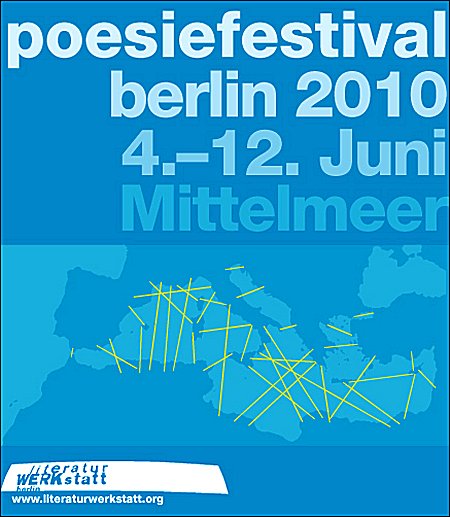
Poesiefestival Berlin 4 – 12 June 2010
The 11th poesiefestival berlin will be putting the poetic wealth of the Mediterranean on display from the 4th to the 12th of June 2010.
The Mediterranean has inscribed itself deeply into the myths, history and arts of countless cultures, linking as it does three continents. It is the site of fruitful cultural exchange, but has also spawned bloody conflicts.
From 4 – 12 June 2010, the poesiefestival berlin will be presenting for the first time in Germany poets from almost all the countries bordering the Mediterranean, revealing the region’s special cultural wealth. It will be weighing anchor in the ports of Istanbul and Marseilles, travelling the coasts of North Africa and Arabia, stopping off in Andalusia, Israel and Greece and bringing the poetry of the islands to our ears – with verse, music and dance., e.g. with Mohammed Bennis (Morocco), Abbas Beydoun (Lebanon), Yannis Stiggas (Greece), Küçük Iskender (Turkey), Hedva Harechavi (Israel), Nanni Balestrini (Italy) , Neşe Yaşin (Cyprus). The 2010 edition of the translation workshop VERSschmuggel will bring together poets from Italy and the German-speaking countries.
Once again, stars of the international poetry scene will gracing the stage at the opening event, Weltklang – Nacht der Poesie, the sounds of the world in an evening of poetry. This year with: Michael Ondaatje (Canada), Michael Krüger (Germany), Anat Pick (Israel), Nina Kibuanda (Kongo), Cole Swensen (USA), Elke Erb (Germany), Dmitry Golynko (Russia) und Raúl Zurita (Chile).
The poesiefestival berlin, with well over 10,000 visitors each year, is one of Europe’s largest poetry festivals and enjoys a reputation worldwide. In the past it has featured such poets as Lawrence Ferlinghetti, Herta Müller, Paul Muldoon, Laurie Anderson, Volker Braun, Derek Walcott, Rita Dove and Friederike Mayröcker.
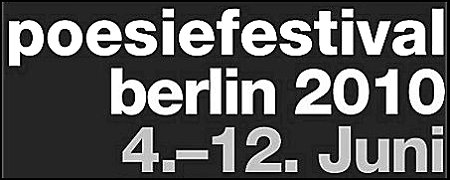
Das 11. poesiefestival berlin zeigt vom 4. – 12.6.2010 den poetischen Reichtum des Mittelmeerraums.
Das Mittelmeer verbindet drei Kontinente miteinander und hat sich tief in Mythen, Geschichten und Künste unzähliger Kulturen eingeschrieben. Es ist Ort fruchtbaren kulturellen Austauschs, aber auch Ausgangspunkt blutiger Konflikte.
Vom 4.-12.6.2010 präsentiert das poesiefestival berlin erstmals in Deutschland Dichter aus fast allen Anrainerstaaten des Mittelmeers und die gesamte Region als besonderen kulturellen Raum. Es legt an in den Häfen von Istanbul und Marseille, bereist die Küsten Nordafriks und Arabiens, macht Halt in Andalusien, Israel und Griechenland und bringt Poetisches der Inseln zu Gehör: in Vers, Musik und Tanz, u.a. mit Mohammed Bennis (Marokko), Abbas Beydoun (Libanon), Yannis Stiggas (Griechenland), Küçük Iskender (Türkei), Hedva Harechavi (Israel), Nanni Balestrini (Italien) , Neşe Yaşin (Zypern).
Den Übersetzungsworkshop VERSschmuggel des Jahres 2010 bestreiten Dichterinnen und Dichter aus Italien und der deutschsprachigen Länder.
Zur Eröffnungsveranstaltung „Weltklang – Nacht der Poesie“ sind wieder die Stars der internationalen Lyrik zu Gast. In diesem Jahr mit Michael Ondaatje (Kanada), Michael Krüger (Deutschland), Anat Pick (Israel), Nina Kibuanda (Kongo), Cole Swensen (USA), Elke Erb (Deutschland), Dmitry Golynko (Russland) und Raúl Zurita (Chile).
Das poesiefestival berlin gilt mit seinen jährlich weit über 10.000 Besuchern als das größte Europas und genießt weltweit hohes Renommee. Bisher waren u.a. Lawrence Ferlinghetti, Herta Müller, Paul Muldoon, Laurie Anderson, Volker Braun, Derek Walcott, Rita Dove und Friederike Mayröcker zu erleben.
poesiefestival berlin
4. – 12. Juni 2010
Akademie der Künste, Hanseatenweg 10, 10557 Berlin
Website: Literaturwerkstatt Berlin
![]()
fleursdumal.nl magazine
More in: Art & Literature News
.jpg)
Edgar Allan Poe
(1809-1849)
Old English Poetry
It should not be doubted that at least one-third of the affection with which we regard the elder poets of Great Britain should be-attributed to what is, in itself, a thing apart from poetry-we mean to the simple love of the antique-and that, again, a third of even the proper poetic sentiment inspired by their writings should be ascribed to a fact which, while it has strict connection with poetry in the abstract, and with the old British poems themselves, should not be looked upon as a merit appertaining to the authors of the poems. Almost every devout admirer of the old bards, if demanded his opinion of their productions, would mention vaguely, yet with perfect sincerity, a sense of dreamy, wild, indefinite, and he would perhaps say, indefinable delight; on being required to point out the source of this so shadowy pleasure, he would be apt to speak of the quaint in phraseology and in general handling. This quaintness is, in fact, a very powerful adjunct to ideality, but in the case in question it arises independently of the author’s will, and is altogether apart from his intention. Words and their rhythm have varied. Verses which affect us to-day with a vivid delight, and which delight, in many instances, may be traced to the one source, quaintness, must have worn in the days of their construction, a very commonplace air. This is, of course, no argument against the poems now-we mean it only as against the poets thew. There is a growing desire to overrate them. The old English muse was frank, guileless, sincere, and although very learned, still learned without art. No general error evinces a more thorough confusion of ideas than the error of supposing Donne and Cowley metaphysical in the sense wherein Wordsworth and Coleridge are so. With the two former ethics were the end-with the two latter the means. The poet of the “Creation” wished, by highly artificial verse, to inculcate what he supposed to be moral truth-the poet of the “Ancient Mariner” to infuse the Poetic Sentiment through channels suggested by analysis. The one finished by complete failure what he commenced in the grossest misconception; the other, by a path which could not possibly lead him astray, arrived at a triumph which is not the less glorious because hidden from the profane eyes of the multitude. But in this view even the “metaphysical verse” of Cowley is but evidence of the simplicity and single-heartedness of the man. And he was in this but a type of his school-for we may as well designate in this way the entire class of writers whose poems are bound up in the volume before us, and throughout all of whom there runs a very perceptible general character. They used little art in composition. Their writings sprang immediately from the soul-and partook intensely of that soul’s nature. Nor is it difficult to perceive the tendency of this abandon-to elevate immeasurably all the energies of mind-but, again, so to mingle the greatest possible fire, force, delicacy, and all good things, with the lowest possible bathos, baldness, and imbecility, as to render it not a matter of doubt that the average results of mind in such a school will be found inferior to those results in one (ceteris paribus) more artificial.
We can not bring ourselves to believe that the selections of the “Book of Gems” are such as will impart to a poetical reader the clearest possible idea of the beauty of the school-but if the intention had been merely to show the school’s character, the attempt might have been considered successful in the highest degree. There are long passages now before us of the most despicable trash, with no merit whatever beyond that of their antiquity.. The criticisms of the editor do not particularly please us. His enthusiasm is too general and too vivid not to be false. His opinion, for example, of Sir Henry Wotton’s “Verses on the Queen of Bohemia”-that “there are few finer things in our language,” is untenable and absurd.
In such lines we can perceive not one of those higher attributes of Poesy which belong to her in all circumstances and throughout all time. Here every thing is art, nakedly, or but awkwardly concealed. No prepossession for the mere antique (and in this case we can imagine no other prepossession) should induce us to dignify with the sacred name of poetry, a series, such as this, of elaborate and threadbare compliments, stitched, apparently, together, without fancy, without plausibility, and without even an attempt at adaptation.
In common with all the world, we have been much delighted with “The Shepherd’s Hunting” by Withers–a poem partaking, in a remarkable degree, of the peculiarities of “Il Penseroso.” Speaking of Poesy the author says:
“By the murmur of a spring, Or the least boughs rustleling, By a daisy whose leaves spread, Shut when Titan goes to bed, Or a shady bush or tree, She could more infuse in me Than all Nature’s beauties can In some other wiser man. By her help I also now Make this churlish place allow Something that may sweeten gladness In the very gall of sadness-The dull loneness, the black shade, That these hanging vaults have made The strange music of the waves Beating on these hollow caves, This black den which rocks emboss, Overgrown with eldest moss, The rude portals that give light More to terror than delight, This my chamber of neglect
Walled about with disrespect; From all these and this dull air A fit object for despair, She hath taught me by her might To draw comfort and delight.”
But these lines, however good, do not bear with them much of the general character of the English antique. Something more of this will be found in Corbet’s “Farewell to the Fairies!” We copy a portion of Marvell’s “Maiden lamenting for her Fawn,” which we prefer-not only as a specimen of the elder poets, but in itself as a beautiful poem, abounding in pathos, exquisitely delicate imagination and truthfulness-to anything of its species:
“It is a wondrous thing how fleet ‘Twas on those little silver feet, With what a pretty skipping grace It oft would challenge me the race, And when’t had left me far away ‘Twould stay, and run again, and stay; For it was nimbler much than hinds, And trod as if on the four winds. I have a garden of my own, But so with roses overgrown, And lilies, that you would it guess To be a little wilderness; And all the spring-time of the year It only loved to be there. Among the beds of lilies I Have sought it oft where it should lie, Yet could not, till itself would rise, Find it, although before mine eyes. For in the flaxen lilies’ shade It like a bank of lilies laid; Upon the roses it would feed Until its lips even seemed to bleed, And then to me ‘twould boldly trip, And print those roses on my lip, But all its chief delight was still With roses thus itself to fill, And its pure virgin limbs to fold In whitest sheets of lilies cold. Had it lived long, it would have been Lilies without, roses within.”
How truthful an air of lamentations hangs here upon every syllable! It pervades all.. It comes over the sweet melody of the words-over the gentleness and grace which we fancy in the little maiden herself-even over the half-playful, half-petulant air with which she lingers on the beauties and good qualities of her favorite-like the cool shadow of a summer cloud over a bed of lilies and violets, “and all sweet flowers.” The whole is redolent with poetry of a very lofty order. Every line is an idea conveying either the beauty and playfulness of the fawn, or the artlessness of the maiden, or her love, or her admiration, or her grief, or the fragrance and warmth and appropriateness of the little nest-like bed of lilies and roses which the fawn devoured as it lay upon them, and could scarcely be distinguished from them by the once happy little damsel who went to seek her pet with an arch and rosy smile on her face. Consider the great variety of truthful and delicate thought in the few lines we have quotedthe wonder of the little maiden at the fleetness of her favorite-the “little silver feet”–the fawn challenging his mistress to a race with “a pretty skipping grace,” running on before, and then, with head turned back, awaiting her approach only to fly from it again-can we not distinctly perceive all these things? How exceedingly vigorous, too, is the line,
“And trod as if on the four winds!”
A vigor apparent only when we keep in mind the artless character of the speaker and the four feet of the favorite, one for each wind. Then consider the garden of “my own,” so overgrown, entangled with roses and lilies, as to be “a little wilderness”–the fawn loving to be there, and there “only”–the maiden seeking it “where it should lie”–and not being able to distinguish it from the flowers until “itself would rise”–the lying among the lilies “like a bank of lilies”–the loving to “fill itself with roses,”
“And its pure virgin limbs to fold In whitest sheets of lilies cold,”
and these things being its “chief” delights-and then the pre-eminent beauty and naturalness of the concluding lines, whose very hyperbole only renders them more true to nature when we consider the innocence, the artlessness, the enthusiasm, the passionate girl, and more passionate admiration of the bereaved child–
“Had it lived long, it would have been Lilies without, roses within.”
Edgar Allan Poe: Old English Poetry
kempis poetry magazine
More in: Archive O-P, Edgar Allan Poe, Poe, Edgar Allan

Heilloos verlangen
door Kees Godefrooij
Om meer te doen dan louter liggen staren
om vat te krijgen op dit tijdsgewricht
leg ik wat woorden vast in een gedicht
als poging om de onlust te verklaren
maar leven in een vers stuit op bezwaren
vandaar dat ik mij anderszins verplicht
en mee zal trekken met het wijkend licht
tot in de eeuw van de Salons, de jaren
waarin blank marmer onbeschaamd zou stoeien
met de bronzen gloed van de Romantiek
en rechters zich met B* zouden bemoeien
vanwege zijn onkuise symboliek
een eeuw waarin de kunsten konden bloeien
en ik, die alsmaar zweef op haar thermiek
B* = Charles Baudelaire, tegen wie een proces werd aangespannen vanwege aanstootgevende gedichten.
Kees Godefrooij (Rotterdam 1951) laat zich inspireren door de kunst van de Antieken, de Italiaanse Renaissance, de literatuur van de Zwarte Romantiek en hedendaagse voorvallen. Hij heeft een voorkeur voor de vorm van het sonnet hoewel hij het vrije vers niet afwijst. Godefrooij woonde ondermeer in Kopenhagen en Barcelona en begon op latere leeftijd met een studie cultuurwetenschappen. Het was tijdens de studie dat hij de poëzie ontdekte van ondermeer Baudelaire en Rilke. Vijftien jaar geleden begon hij gedichten te schrijven, zijn poëzie verscheen op diverse plekken, in druk als wel op het internet. In eigen beheer zijn er inmiddels zes bundels verschenen.
kempis poetry magazine
More in: Godefrooij, Kees
Thank you for reading Fleurs du Mal - magazine for art & literature